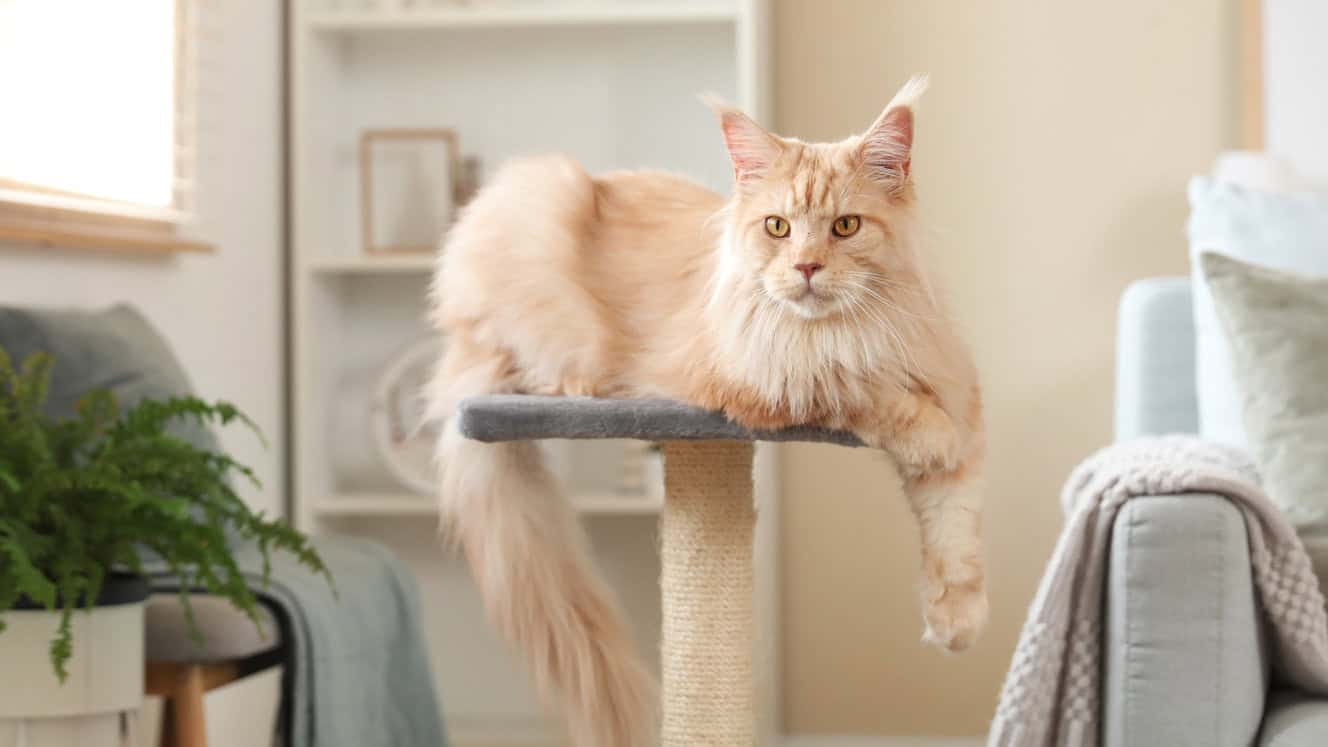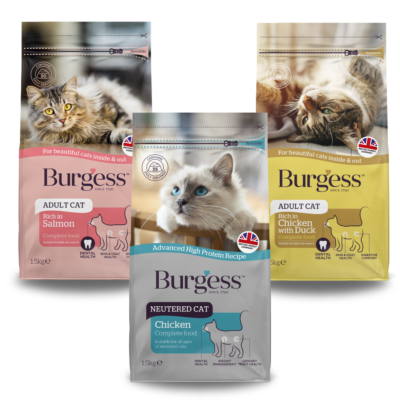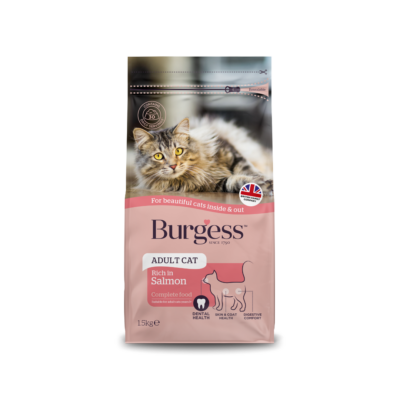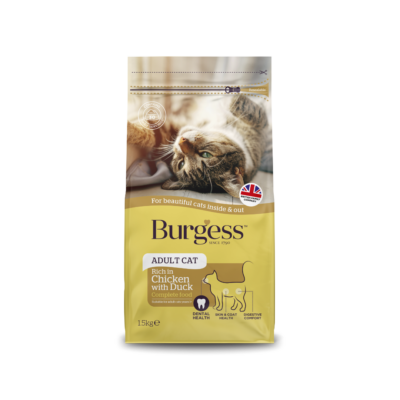
With its magnificent coat and magnetic personality, the Maine Coon cat is a large, even-tempered, stunningly beautiful breed with a fascinating back story.
“Often known as ‘the gentle giant’, their temperament belies their size, for they are gentle and friendly, as well as playful,” states Your Cat. “They make wonderful family pets as they enjoy being involved in whatever is going on with their humans and form strong bonds with their family.”
“The temperament of a Maine Coon cat is one of the key reasons people love these beautiful shaggy beasts,” adds Petplan. “Their chilled nature is great to be around. One of the key Maine Coon cat personality traits is loyalty – they will often attach themselves to one person like a dog. While they’re not generally a lap cat, they’re friendly, tactile and affectionate.”
“Maine Coons are the clowns of the cat world,” notes the Maine Coon Cat Club. “They are in general highly intelligent, but a dripping tap can turn them into idiots, as they happily spend hours catching drops.”
Where did they get their name from?
The name 'Maine' comes from the Northeastern American State where the breed originated. Some suggest they evolved from long-haired cats brought to America by the Vikings, or perhaps from Turkish Angora types, taken across the Atlantic by seafarers, who mated with the domestic shorthairs introduced by early settlers.
It’s thought that the ‘coon’ part could be due to their long, bushy tails, which resemble racoon tails. The Maine Coon Cat Club explains: “Long ago, people thought that they must have evolved from matings between domestic cats and racoons. Of course, we now know that this is genetically impossible, but this may have been where the name came from.”
According to folklore, the name could by thanks to Captain Charles Coon, who kept long-haired cats aboard his ship. When he docked in New England ports, his cats would mix with the local cats, and, when long-haired kittens started to appear, they were known as ‘Coon’s cats’.
Whatever their true origins may be, the ancestors of today’s Maine Coons lived and thrived on New England farms. With their large, pointed-tipped ears, big eyes, outsize paws and strong, muscular frame, Maine Coons were highly prized for their vermin-catching abilities. In fact, these cats were so popular that, in the 1860s, New England farmers initiated an annual cat show. Maine Coons from all over the territory competed for the coveted title of ‘Maine State Champion Cat’.
A change in fortune – and a comeback!
However, things took a downturn for Maine Coons in the early 1900s, thanks to the arrival of the glamorous Persian to American shores. Persians quickly won legions of fans and became the dominant breed of the era. Coonies continued to decline in popularity for several decades until the 1950s, when thanks to efforts by Maine Coon enthusiasts and a renewed interest in the breed, they began to make a comeback.
By 1976, Maine Coons obtained full Championship Status in the USA, and in the 1980s, they began to appear in the UK. In 1993, the Maine Coon was granted full GCCF (Governing Council of the Cat Fancy) Championship Status. Today, Maine Coons are now the third most popular breed being registered.
Read on to find out more about Maine Coon cats – from grooming, to feeding and providing them with everything they need to live a fulfilling and happy life. But first, check out these fun Maine Coon facts!
AMAZING MAINE COON CAT FACTS
- Maine Coons are the heavyweights of the cat world – females can weigh 12 pounds, while males can reach up to 18-20 pounds. The Guinness World Records title for the longest cat is a Maine Coon called Barivel, measuring 120cm (3ft 11.2 ins) from nose to tail tip! Meet Barivel and his human family here >>
- Their incredibly bushy tails are typically as long as their body – this enables Coonies to wrap their tail around their body, rather like a blanket, for extra insulation.
- Maine Coons mature slowly than many other breeds and may not reach their full size until they are between 3 and 5 years old.
- Their fabulous, shaggy coat comes in dozens of colour combinations including tortoiseshell, tabby, tortie-tabbies, smoke and shaded. The shagginess traps air which helps to keep these cats warm and toasty (very useful during those harsh New England winters).
- Maine Coons are fascinated by water. Their coat is weather-proof and semi-water repellent – a legacy, perhaps, of their early seafaring days, and, unusually for a cat, Maine Coons are natural swimmers. Having a bath? Your Coonie may dip their paws in, or even attempt to join you in the tub!
- In the Harry Potter films, the cat character Mrs Norris, owned by caretaker Argus Filch, was played by several Maine Coon cats – Pebbles (filmed pacing the corridors of Hogwarts) and three rescue cats called Maximus (trained to jump on Filch’s shoulders) Alanis (adept at sitting quietly in the actor’s arms) and Cornilus (trained to sit still and look round on command).
- Often called the ‘dog of the cat world’ due to their playful nature and intelligence, Maine Coons are incredibly loyal to their owners and some have even been known to play fetch!
MAINE COON PERSONALITY PROFILE
Maine Coons are inquisitive, intelligent, sociable, playful, affectionate and talkative – although they chirp rather than meow. They are known for being quite noisy when it comes to mealtimes!
“The Maine Coon has a sweet temperament,” says Your Cat. “They have a quiet chirping voice, although they can also yowl when demanding food. Retaining their playful ways throughout their life, they are an affectionate and fun companion.”
“The Maine Coon cat is gentler than its massive size and shaggy appearance suggest,” notes Petplan. “They have a broad range of vocalisations, and they’ll happily chat to you about their day or call you when they want a bit of attention.”
“They are extremely smart and thrive in a home environment because they like to know what is going on in a household. They enjoy being involved in everything that goes on and learn new things quickly,” adds Pets4Homes. “They form strong bonds with their owners and families but are never clingy being quite independent characters by nature.”
The Maine Coon Cat Club describes them as a highly intelligent, affectionate, and adaptable breed: “They normally adapt to new surroundings with the greatest of ease, taking one look at any other felines as if to say ‘Hi, I'm here and I'm stopping’,” adding that they adore attention but are not overly demanding.” The GCCF says: “Maine Coon cats are affectionate and tactile pets – always up for a cuddle; they are said to be very intelligent and can be taught to fetch, walk on leads and open doors.”
IS MY HOME SUITABLE FOR A MAINE COON CAT?
As large cats, Maine Coons need plenty of space both indoors and out.
“They are high energy and, because of their large size, need plenty of room to play and work off their natural hunting instinct,” says Your Cat. “They love being able to roam around in the great outdoors,” adds Pets4Homes. “They are best suited to people who live in a country environment where it is safer for a cat to be able to explore their outside environment.”
“This is a breed which needs access to outside space to keep them happy and active, as they are incredibly athletic, so they won’t do well as indoor cats,” advises Petplan.
They like company and will generally bond well with another cat or the family dog. They don’t like to be left on their own for long periods and are best suited to households where someone is home most of the time.
The GCCF advises: “Maine Coon cats do not cope very well as an only pet or with owners who are out at work all day.” Petplan adds: “Maine Coons are independent but can get lonely if left on their own for long periods. Generally, it is recommended to get a pair of Maine Coons so they can entertain each other while their humans are away.”
Good-natured and gentle Maine Coons also get along well with children. “Maine Coons, with their outgoing affectionate and gentle personalities, are the perfect choice for families with children,” notes Pets4Homes. “However, care has to be taken when very young children are around cats and any interaction should always be well supervised to make sure things stay nice and calm. Children need to be taught how to behave around cats and when to leave them alone.”
WHAT DO MAINE COONS LIKE TO DO?
While every cat is an individual with a unique set of likes and dislikes, there are certain things that are extremely important to smart, athletic Maine Coon cats – namely lots of outdoor exploring and climbing opportunities and plenty of interactive games to satisfy their innate hunting behaviours. They also like to survey their territory from a variety of vantage points.
Petplan says: “Maine Coons are active and adventurous, so they’ll need plenty of exercise and lots of games to keep them engaged. Maine Coon cats tend to pick up tricks and new skills easily. However, you will need to be patient and invest in plenty of cat toys and cat games to keep them motivated.”
Motivating your Maine Coon to help them stay in shape is very important for their health and wellbeing. The Maine Coon Cat Club advises: “Some Maine Coons can become overweight or even obese, so regular exercise is essential to keep your cat fit and healthy. Interactive play sessions, perhaps 10-minute sessions three times a day will certainly be of benefit.”
Due to their size, you’ll need to think big – ample, comfy sleeping spots, spacious hideaway places, roomy litter trays, generously-sized cat tunnels for them to run through and play in – and very sturdy scratching posts and climbing trees that will support their weight.
GROOMING YOUR MAINE COON CAT
Get your cat brushes and wide-toothed combs at the ready – this is a cat that requires lots of grooming!
“Because they have a long, thick, shaggy coat, they will require regular grooming to keep the coat in good condition and prevent knots and mats,” advises Your Cat. “They can shed quite heavily in the spring, when extra care will have to be taken to ensure any old, dead coat is removed.”
As with all cats, regular grooming should be “introduced gently to young kittens using positive reinforcement techniques,” adds Petplan. “Grooming a Maine Coon cat should be done two or three times a week to prevent tangling and matting. Grooming Maine Coons also helps them to shed dead fur, detangle knots before they get matted, and clean debris from their tails – these active cats love to explore, and a lot of that exploring comes home with them!”
TOP TIP! Maine Coons can be more prone to heart conditions than other breeds, so it’s always best to have regular vet check-ups – and get them used to being handled – to stay on top of any health issues.
FEEDING YOUR MAINE COON CAT
As a large cat, you may find that your Maine Coon eats a little more than most cat breeds.
Petplan advises: “Like all cats, Maine Coon cats are obligate carnivores, so they need to eat meat. But these cats are high energy, so the best Maine Coon cat food is one that provides them with all the nutrients they need. Due to their size, Maine Coon cats tend to eat a lot more than most normal house cats and, as don’t fully mature in size until they’re at least four years old, so their food intake will grow as they do.”
An easily accessible supply of fresh water is also vital. Petplan adds: “Maine Coon cats like to drink a lot of water, so ensuring fresh, clean water is on hand at all times is essential and placed away from their food bowl.”
Be aware that these cats really love to play with water! The Maine Coon Cat Club notes: “Maine Coons do seem to enjoy playing with water and will often be seen pawing at their water bowl before drinking. Putting the water bowl on a tray or large broad bowl to catch excess water that drips over helps to prevent your floor from becoming soaked. Some owners find that their cats really enjoy drinking from a water fountain.”
GETTING A MAINE COON CAT
If you’re looking for a kitten, only ever buy from a reputable breeder. Alternatively, visit the Welfare and Rescue Page of the Maine Coon Cat Club to find beautiful cats looking for happy new homes. Also check out other rescue charities such as Cats Protection, Battersea, Blue Cross, RSPCA and Woodgreen, who’ll be delighted to hear from you, and can provide you with lots of helpful advice on adopting a rescued cat.
EVERY CAT DESERVES A DELICIOUS, NUTRITIOUS DINNER!
At Burgess Pet Care, all our cat food is made using premium ingredients to ensure excellent quality and superior taste to help keep your cat happy and healthy – from kitten, to adult and mature and our award-winning variety for neutered cats – available in a range of sizes.
- Salmon? Duck? Chicken? Let your adult cat pick their favourite flavour with our fussy cat bundle >>
- Our cat diet and nutrition guide is here to help you create a meal plan that's tailored especially for your feline friend.
- How often should you feed your cat? Find out why little and often suits most cats – and the reason why play should be part of your feeding routine.
- Adapting your cat’s diet throughout their life What you choose to feed your cat can make all the difference.
Is your cat a Burgess cat? Join the Burgess Pet Club for exclusive offers and rewards.
If you found this interesting, you may also like:
THE NEXT BIG STEP FOR YOUR LITTLE CAT When does your kitten become a cat? What changes will you see in their behaviour? When do you need to switch them over from kitten to adult cat food – and what are the nutrition differences that benefit them as they grow?
CAT BREEDS – TAKE A CLOSER LOOK AT SOME OF THE UK’S MOST POPULAR TYPES OF CAT Siamese or Bengal? Norwegian Forest or Maine Coon? Ragdoll or Russian Blue? Which breed of cat do you find most captivating? We count down 10 cat breeds that are riding high in the popularity charts, plus one favourite feline that’s not actually a breed at all…
WHEN SHOULD YOU NEUTER YOUR CAT? As well as preventing unwanted pregnancies, neutering benefits your favourite feline’s health and wellbeing in all sorts of ways. In fact, feline experts believe it’s the kindest thing you could do for your cat.
CAN YOU TRAIN A CAT? Felines excel at training their human guardians to give them food, attention and a cosy lap to curl up on. But is it possible for us to train them?
ARE YOU AND YOUR CAT MORE ALIKE THAN YOU THINK? If you have a grumpy Tabby cat, a super friendly Ragdoll cat, or fiendishly feisty Bengal cat, could this actually say more about you than your pet?
HOW TO TELL IF YOUR CAT REALLY LOVES YOU While you may adore your captivating cat, how does your enigmatic feline companion feel about you?
MUSIC TO THEIR FURRY LITTLE EARS? What’s on your playlist? Cat Stevens? The Stray Cats? The Pussycat Dolls? And have you ever wondered if your cat appreciates your taste in music, or would they prefer music created especially for them? Yes, it’s a thing!
PLAY BEHAVIOUR OF CATS SURPRISES SCIENTISTS While there are lots of things that cats do which cause scientists plenty of head-scratching moments, new research into the way that cats play has resulted in some rather baffled boffins...
THE EYES HAVE IT When it comes to the mysterious task of understanding cat language, focusing on one of a feline’s most appealing features – their captivatingly beautiful eyes – could be the key.
SHOULD LILIES CARRY A HEALTH WARNING? Did you know that lilies are so poisonous that a cat can suffer fatal kidney failure just from nibbling a leaf, licking pollen off their coat or even from drinking water from a vase with cut lilies in it?
DOES YOUR CAT RECOGNISE YOUR HAPPY FACE? How do cats see humans? Do cats recognise faces? Do cats remember people? Do cats miss their owners? Do we own cats or do cats own us?
IS YOUR CAT REALLY MAD AT YOU? Whether it’s because you’ve had to take them to the vet, or you accidentally stepped on their tail, your cat may give you the impression that they’re really cross with you. But can cats really hold grudges?
HOW TO HANDLE YOUR CAT Cats like to feel in control of whatever situation they’re in and are quick to show when they’re not happy. Never is this more evident when it comes to being handled when they don’t want to be.
MY CAT IGNORES ME – WHY? Unlike dogs, who generally want to be involved in every situation, cats are known for being independent. While some cats can be quite social, it can be hard to take when your favourite feline seems to take absolutely no notice of you. So why is this the case?
GIRLS V BOYS – FELINE MYTHS AND MISCONCEPTIONS Do male and female cats act differently because of their gender? Are generalisations about laid back, lap-loving boys and aloof, independent girls simply myths – or is there any truth to them?
DOES YOUR CAT KNOW THEIR NAME? Whatever name we choose to bestow upon our beloved pet cats, does it make any difference to them? Do they actually understand that they’re called Alfie or Bella or even Archibald von Snugglemuffin?
THE HOMING INSTINCT – CAN CATS REALLY FIND THEIR WAY HOME? Top tip – it’s much easier if they’re microchipped! Plus, what a change in the law means for every cat owner…

















